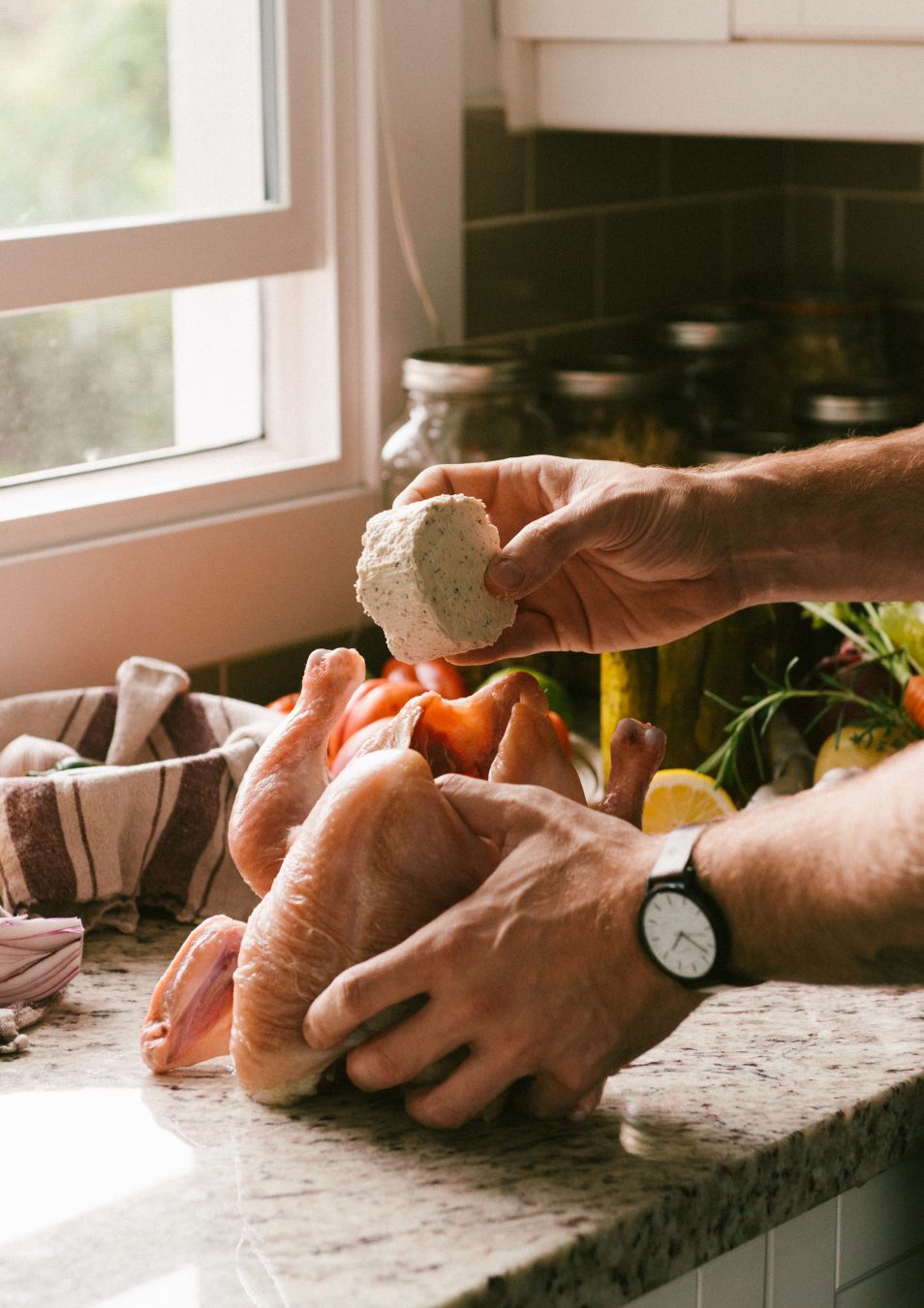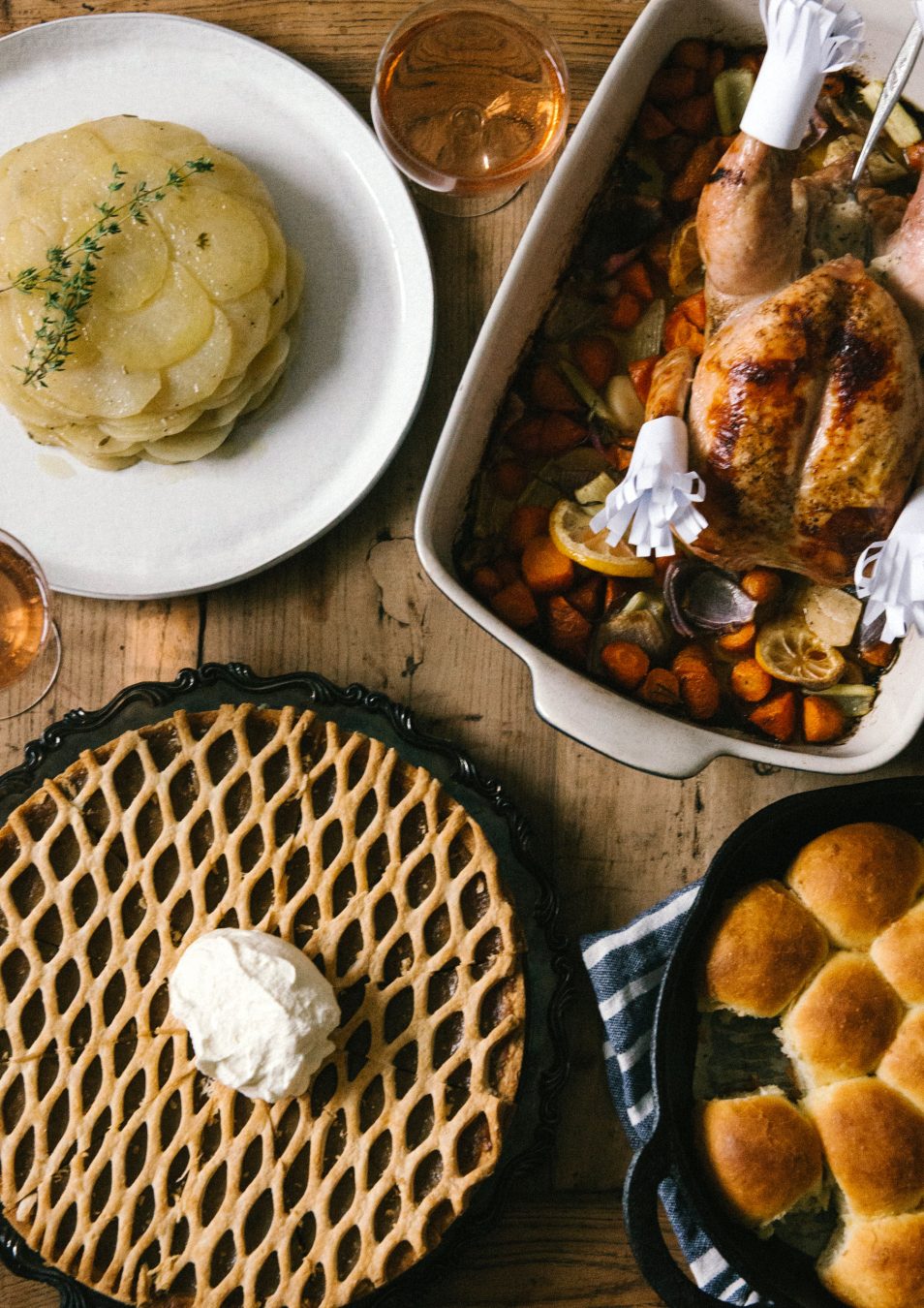Soft late-afternoon light filters through the kitchen windows of chef J.C. Poirier’s East Vancouver home. The entire household is redolent with the aroma of roast chicken as he pulls a perfect golden-brown bird out of the oven. His eldest daughter Aila perches on a stool at the kitchen island, trimming white paper toques for the drumsticks. There’s a Bill Evans album on the turntable, spinning cool jazz to inspire Poirier’s wife Dara while she arranges fresh-cut flowers for the table. Baby Florence giggles happily from the dining-room floor as her mom and dad toast with glasses of bubbly rosé. It’s a family scene that has played itself out over countless Sundays at the Poirier residence, reminiscent of many such evenings during the chef’s childhood around his own mother’s dining room table. All these familiar kitchen scents and rhythms still resonate—both at home, and at his revered Railtown restaurant, St. Lawrence, where his cooking is grounded in tradition, memory, and heart.
The Sunday-night meals of Poirier’s upbringing in Saint-Jérôme, Quebec are indelibly etched in his memory. “My brothers and sisters and I would always wait eagerly for Sunday dinner to happen, because every single one was something special,” he recalls. The guest list would ebb and flow, sometimes including his grandparents, friends, and neighbours—but family was always at the core of these meals.
Poirier established his career at home and then moved to Vancouver in 2004. “The more experience I got under my belt, the more I began to know myself and what was deeply important to me,” he reflects. “I had to leave before I could truly come back home again.” Absence does, indeed, make the heart grow fonder, as he didn’t realize his own profound connection to Quebecois cooking until well after he moved away.
He came up with the concept for St. Lawrence in 2013 while in medias res with the success of his much-fêted Railtown pasta restaurant, Ask For Luigi (he is also a co-owner of Main Street’s Pizzeria Farina, along with Pourhouse and Di Beppe in Gastown). “I was very pleased with what we’d accomplished at Luigi. Even after winning so many awards, though, I still knew there was something missing,” he admits. Inspiration struck while preparing a dinner party for industry friends. He was tasked with making a dessert that was both gluten-free and vegetarian.
“Oeufs à la neige came to mind,” he says. “I’d only ever made it once before at school, but I figured I could wing it.” This classic French dessert, also known as île flottante, consists of pillowy meringues gently poached in milk and served with crème anglaise. “When I dropped the meringue quenelles into the hot milk, I suddenly got so excited that I literally had goosebumps,” recalls Poirier. “Nobody makes this dessert anymore because everyone has forgotten about it, but it was absolutely delicious—my guests loved it. And their enthusiasm helped me realize that this is it. This is what I need to do: teach myself the old classics and honour those traditions by bringing them back to life with a new energy.” With revitalized vigour, he figured, old could become new again.
So back to the basics he went. Poirier spent two years studying old tomes on the seemingly anachronistic minutiae of classical French cooking techniques and the work of gastronomic luminaries such as Paul Bocuse and Alain Chapel. In establishing the foundation for St. Lawrence, he stacked up old-school French recipes alongside the Quebecois dishes of his childhood, fine-tuning the small details until he perfected a balance between the two culinary cultures.
He approaches cooking with respect and a touch of whimsy.
St. Lawrence’s version of Paris-Brest is a savoury take on the traditional French dessert; it’s filled with luxurious foie gras mousse instead of the usual hazelnut mousseline, and is topped with a decadent slice of exquisitely seared duck liver. Even the way Poirier roasts a chicken for Sunday-night family dinners at home incorporates a little twist. “I saw a video of French chef Ludo Lefebvre making his famous Petit Trois omelette stuffed with Boursin cheese, and I was floored,” he says. “I totally forgot about this cheese that’s been around for ages—comforting and super flavourful—and figured, ‘What if I put some cheese in there?’” Poirier drops an entire round of Boursin into the cavity of his chicken along with salt, pepper, and herbs. “It keeps the breast meat incredibly moist, and a chunk of chicken topped with a dollop of the melted cheese tastes so amazing,” he continues. Comforting yet surprising, accessible yet decadent—it’s what home cooking is about.
Above all, what makes Poirier’s work stand out is soul. His food is rooted in a heartfelt desire to connect with the people eating it, whether they’re sitting around his dining room table at home or at the St. Lawrence bar overlooking the kitchen. “I believe that the difference between good chefs and great chefs is that their cooking becomes really personal. Authenticity is key,” he says. “I should be able to put something on a plate and tell that this is an honest extension of myself, my beliefs, of my philosophy, of who I am and what I like. And if our guests eat my food and see the same thing that I see, feel the same thing that I feel, then I’ve truly succeeded.” A meal cooked with love is a wondrous unifier, transforming friends into family.












